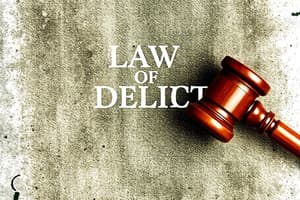Podcast
Questions and Answers
What is the primary element that determines the existence of a duty of care in Scots delict?
What is the primary element that determines the existence of a duty of care in Scots delict?
- The existence of a contractual relationship
- The proximity of the parties involved
- The foreseeability of harm or loss to another person (correct)
- The neighbourhood principle
What is the standard used to determine whether a breach of duty has occurred?
What is the standard used to determine whether a breach of duty has occurred?
- The standard of the defendant's employer
- The standard of the defendant's peers
- The standard of a professional in the same field
- The standard of a reasonable person in similar circumstances (correct)
What is the test used to establish causation in Scots delict?
What is the test used to establish causation in Scots delict?
- The neighbourhood test
- The foreseeability test
- The but for test (correct)
- The proximity test
What is a valid defence to a claim of negligence in Scots delict?
What is a valid defence to a claim of negligence in Scots delict?
What is required to establish negligence in Scots delict?
What is required to establish negligence in Scots delict?
What is the purpose of the but for test in establishing causation?
What is the purpose of the but for test in establishing causation?
Flashcards are hidden until you start studying
Study Notes
Definition of Negligence in Scots Delict
Negligence in Scots delict refers to a breach of a duty of care, resulting in harm or loss to another person.
Requirements for Negligence
To establish negligence in Scots delict, the following elements must be present:
- Duty of care: The defendant owed a duty of care to the pursuer (claimant).
- Breach of duty: The defendant breached their duty of care.
- Causation: The breach of duty caused the harm or loss.
- Damage: The pursuer suffered harm or loss as a result of the breach.
Duty of Care
- A duty of care arises when there is a foreseeable risk of harm or loss to another person.
- The duty of care is not limited to contractual relationships; it can also arise from neighbourhood or proximity.
Breach of Duty
- A breach of duty occurs when the defendant's actions or omissions fall below the standard of care expected of a reasonable person in similar circumstances.
- The standard of care is objective, based on what a reasonable person would do in the same situation.
Causation
- Causation requires proof that the breach of duty caused the harm or loss.
- The but for test is used to establish causation: but for the breach of duty, would the harm or loss have occurred?
Defences to Negligence
- Contributory negligence: The pursuer's own negligence contributed to their harm or loss.
- Exclusion clauses: The defendant has a valid exemption clause that limits or excludes liability.
- Volenti non fit injuria: The pursuer voluntarily assumed the risk of harm or loss.
Remedies for Negligence
- Damages: Monetary compensation for harm or loss suffered.
- Interdict: A court order to prevent future harm or loss.
Notable Cases
- Donoghue v Stevenson (1932): Established the neighbour principle, which extends the duty of care to those who could reasonably be expected to be affected by one's actions.
- McFarlane v Tayside Health Board (1999): Confirmed that the duty of care extends to psychiatric harm caused by a defendant's negligence.
Studying That Suits You
Use AI to generate personalized quizzes and flashcards to suit your learning preferences.




